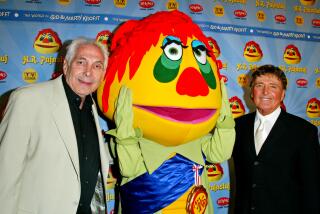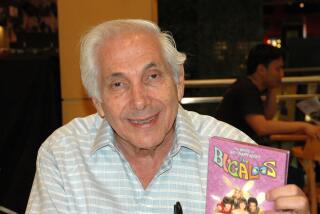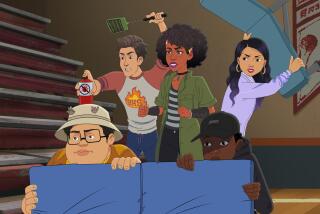Critic’s Pick: TV Picks: ‘Mutt & Stuff,’ ‘Ray Donovan,’ ‘Web Junkie,’ ‘Blackout’
“Mutt & Stuff” (Nickelodeon, Fridays). Sid and Marty Krofft, who ruled Saturday mornings in the 1970s and a little bit beyond with their enchanted lands full of crazy puppets and fuzzy, furry, feathery, felted, big-headed costumed creatures, are back. And don’t tell me you didn’t think they were possibly gone for good, from the Earth, even, and not just the medium.
But they’re here, with their first new series in 24 years, not counting an all-human “Family Affair” revival in 2002. And if its title is not meant to make you think “Pufnstuf,” I will eat my living Lidsville hat. Set in a school for dogs — a preschool, really — where obedience training is not on the docket but playtime, free time and snack time are, the show stars Calvin Millan, the teenage son of TV’s “Dog Whisperer” Cesar Millan (a producer). The eponymous Stuff is the series’ big-costume character, a huge, floppy-eared, talking dog who walks on two legs and eats with a spoon and wears shorts for modesty; all the other dogs in the show are real and full of tricks. Some wear hats.
It is a modest little production, compared with the elaborate stagecraft of “H.R. Pufnstuf” or “The Bugaloos,” and it has only a sliver of their psychedelic eccentricity. But like those and other Krofft shows, including “Sigmund and the Sea Monsters” and “Land of the Lost,” it has the benefit of being set in a real space populated with real living creatures and hand-made, hand-operated, three-dimensional puppets. And in a world where CGI has become the go-to medium for preschool entertainments like this, that comes as something of a blessing and a relief. (Co-creator Bradley Zweig is a veteran of one of them, the PBS series “Sid the Science Kid,” and in related news, Drew Massey, the voice of Sid, is also the voice of Stuff.)
Along with the real dogs and the fake dog and the humans (besides Calvin, there is a little girl in the pilot who needs to learn to give her pup some room to breathe, and to breakdance), there are a couple of bantering cat puppets and a talking fire hydrant, which is weird when you think about it. Airs at the child-friendly hour of 10 a.m.
“Ray Donovan” (Showtime, Sundays). Back for a third year, though somehow I would have guessed the fourth, given all that’s gone on it. As the season begins, we find the principal characters running out of one another’s orbit, with only Ray’s father, Mickey (Jon Voight), and half-brother Daryll (Pooch Hall) consistently occupying the same space and storyline. Having won big at the track and now blown it all, they are hunkered down in a Los Angeles apartment complex, with a tax bill to pay. Brother Terry is in prison, after a failed robbery; other brother Butchy (Dash Mihok), is still recovering from priestly abuse and is running the gym Terry used to run; and Ray is living away from home and ignoring calls from his ailing rejected patron, Elliott Gould’s Ezra.
It’s a series that on paper would be Not My Thing, the story of an L.A.-based dysfunctional Boston Irish family with criminal roots, whose most outwardly successful member — Ray — makes a living cleaning up the high-end, occasionally fatal messes left behind by Hollywood jerks and fools. (So many triggers there.) Ray, who is described to someone interested in his services as “discreet and not afraid of violence,” is the character whose pain is the hardest for the viewer to feel. As with Don Draper, the distance between the character’s instincts and insights and his inability to manage his life in any but a superficial way can make you want to rap him on the head with a rolled-up newspaper.
As an aging, former big cheese who adapts himself with surprising cheer to changing, straitened circumstances while continuing to scheme to dominate them, Voight is a now delightful, now dangerous mix of ignorance and ambition.
In some ways, this tale of damaged maleness (notwithstanding strong work by female regulars Paula Malcolmson and Kerris Dorsey, as Ray’s wife and daughter) feels like the end of a dramatic cycle to me, the one that started with Tony Soprano back in the 20th century and took in “Rescue Me” and “Mad Men” and “Breaking Bad” and on and on.
But the writing is so sure and the parts are (under)played with such casual conviction that I find it reliably a pleasure to watch. Ray is a mess, but he is also heroically hard to ruffle, in an old-fashioned, Gary Cooper or Toshiro Mifune kind of way. (He is a samurai of a sort.) Fearlessness is always intoxicating. (Also, some part of me insists that Ray is going to get it together and get back to his family; I am kind of waiting around for that, quixotically.)
“Web Junkie” (PBS, Monday); “Blackout” (PBS, Tuesday). I’ve probably said this before, but if all you ever did with your television was watch documentaries, which is not to say reality TV, it would be a wise use of the technology and time. You might wind up a better person in the bargain, and at least a better-informed one. HBO may seem to get more glamorous, headline-raking documentaries, but in any given week, PBS is bringing the multifarious world to your TV-screen-shaped door, showing you who we are and were, how we’re alike and different, defined and limited by our culture, how we get along or don’t, and fit into the world or don’t. Also, lions and tigers and birds and stars and planets.
“Web Junkie,” this week’s presentation of the PBS series “POV,” goes among the residents, patients and inmates of a “Teenagers Mental Growth Center” in China. Internet addiction has been classified as a clinical disorder there, with teenagers — boys here — its main victim, foregoing school and hygiene to keep playing video games in huge arcades where they jacked in like the Matrix. (“What is 15 days multiplied by 24 hours?” asks one, trading stories with his friends.) That means they’re the main victim of the cure as well, bunged by parents into one of hundreds of “rehabilitation camps,” where they are therapized and medicated and made to run and stand still and sometimes put into solitary confinement.
Casual students of Chinese history will find this somehow familiar — “They destroy our old beliefs and make new ones for us,” says one resident/patient/inmate — and there is something disquieting in the meanness of the facility and the coolness of the wardens and a doctor’s claim that these kids “are the same as heroin addicts — that’s why we call it ‘electronic heroin.’ ” But we’re also watching people in genuine distress, and genuinely concerned, who are looking for some kind of human connection — both the kids for whom “reality is too fake” and the parents who would like their children back in a world they recognize. “You know how I felt when I heard the sound of your keyboard,” says one distraught mother. As a fly-on-the-wall institutional documentary, Hilla Medalia and Shosh Shlam’s film has something of that Frederick Wiseman feel we approve of here.
“Blackout,” arriving by way of “American Experience,” is a kind of real-life disaster movie that looks at the hot night and following day in July 1977 when the lights went out in New York City, all over the five boroughs. On top of the World Trade Center, they broke out the champagne, but in poor neighborhoods without police — where residents had been instructed to report to the precinct nearest their own homes — looting broke out, and then fires. (“Electricity is a kind of keystone for civility,” says one Con Ed employee in charge of getting power back.)
The looting was not mere opportunism, Callie T. Wiser’s film holds, but more of a bursting dam. There was 12 percent unemployment in New York, which was also on the verge of bankruptcy, with federally imposed austerity programs stripping its citizens of services, converting what had once been “a great working-class city” into “a city of desperation.” Of the more than 3,000 people arrested, most were not professional, habitual or even casual criminals; more than one commentator mentions the stealing of Pampers. (Hospital emergency rooms were full of people getting treated for being cut by glass during the looting.) Even so, the damage was done, and for something like 1,500 business owners, it was substantial and traumatic.
Robert Lloyd sends and receives tweets @LATimesTVLloyd
More to Read
The complete guide to home viewing
Get Screen Gab for everything about the TV shows and streaming movies everyone’s talking about.
You may occasionally receive promotional content from the Los Angeles Times.






